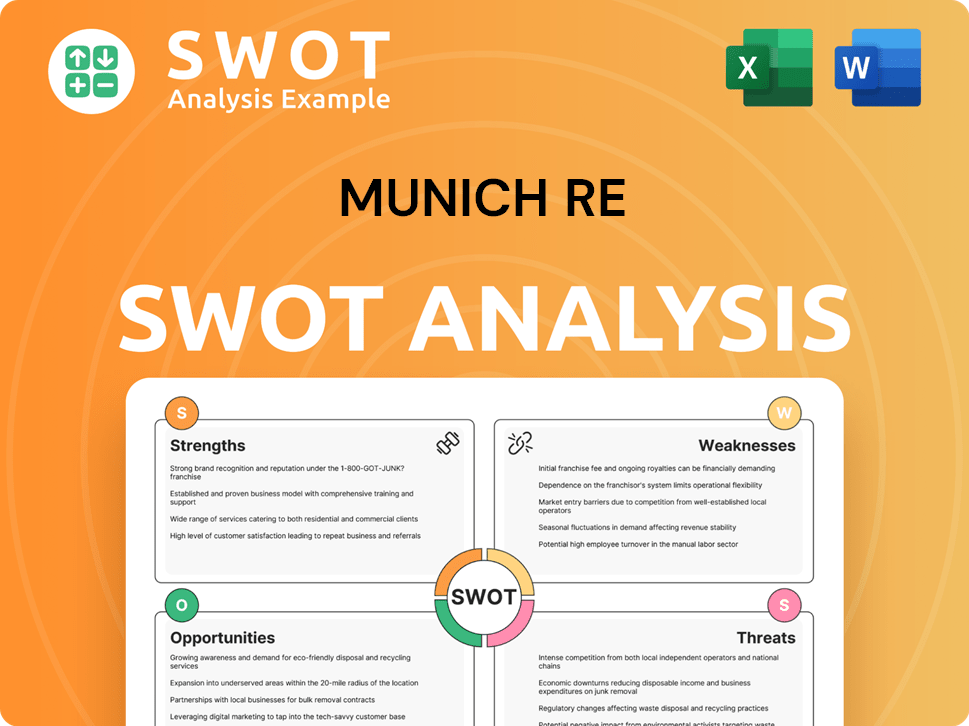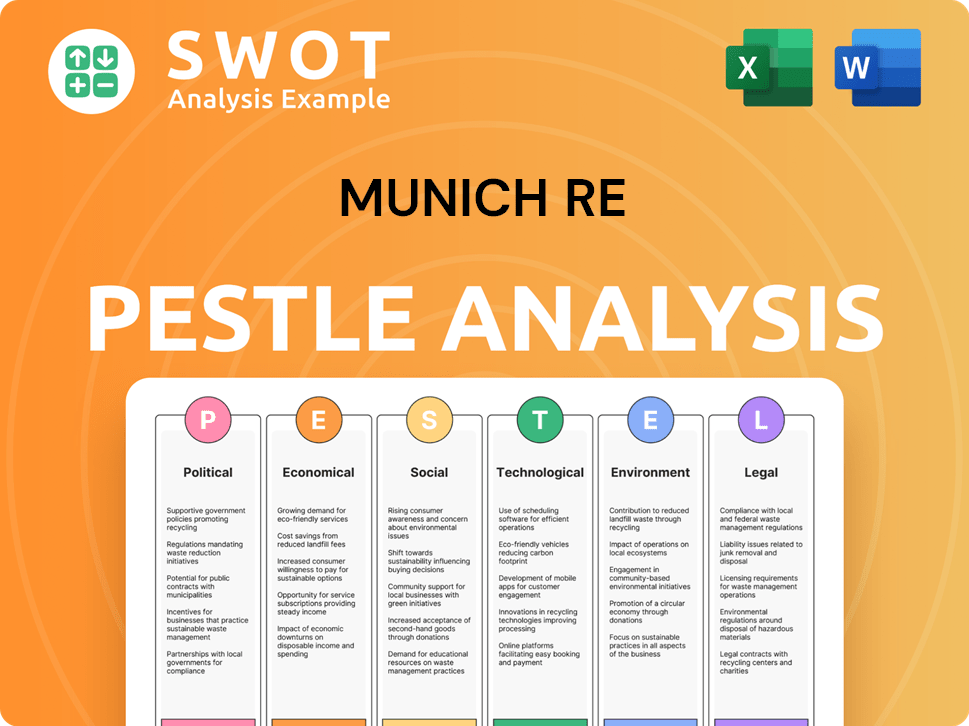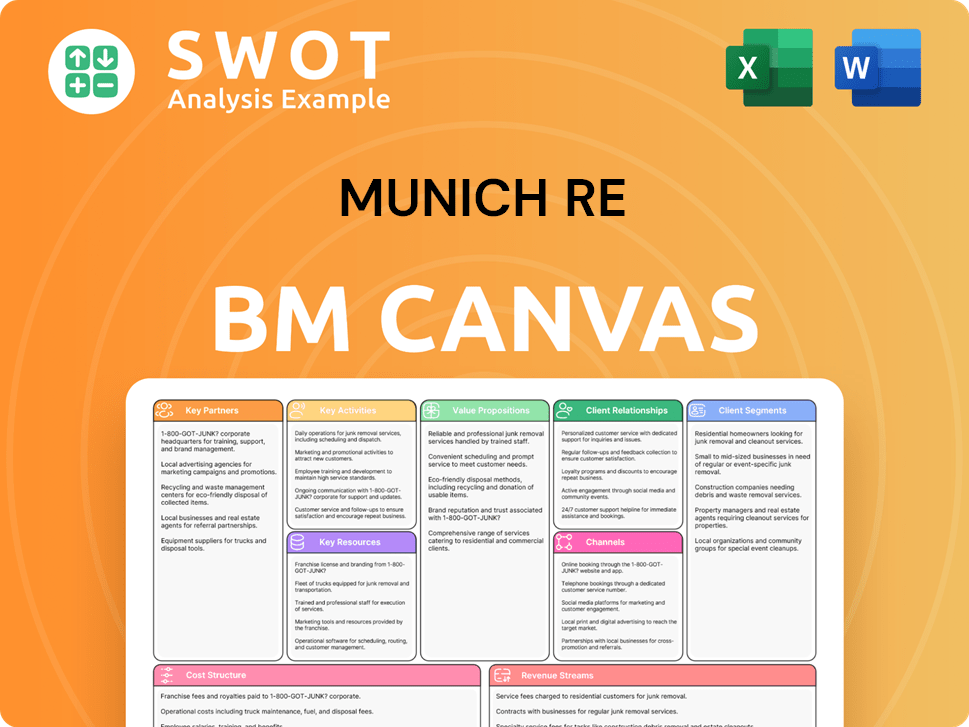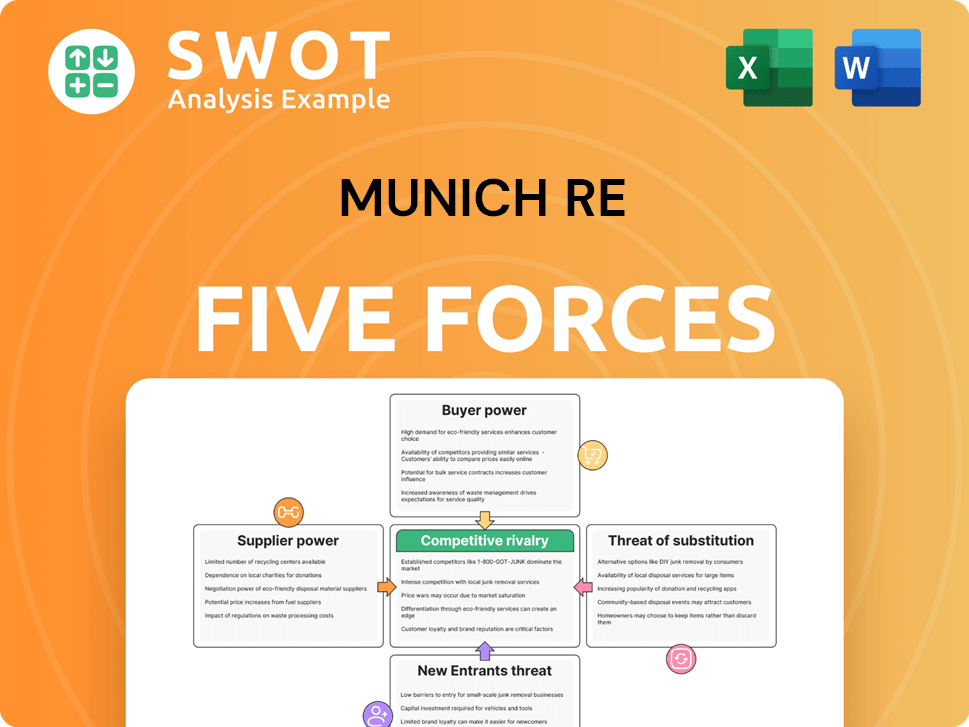Munich Re Bundle
Can Munich Re Continue Its Reign in the Reinsurance Market?
Munich Re, a titan in the reinsurance world, has consistently proven its ability to adapt and thrive. Its journey, from a humble beginning in 1880 to a global leader, showcases a commitment to forward-thinking strategies. The company's embrace of new risks and expansion into diverse markets sets the stage for an exciting future.

Understanding the Munich Re SWOT Analysis is key to grasping its strategic moves in the dynamic reinsurance market. Munich Re's growth strategy, including strategic acquisitions and digital transformation initiatives, is crucial for navigating the evolving insurance industry trends. This article delves into Munich Re's future prospects, exploring its response to global economic changes and its innovative insurance products, providing a comprehensive look at a company shaping the future of risk management solutions.
How Is Munich Re Expanding Its Reach?
The core of Munich Re's strategy, outlined in its 'Group Ambition 2025,' focuses on several key areas. These include scaling its core reinsurance business, developing new business models, and achieving ambitious financial goals. The company is actively pursuing organic growth opportunities, particularly in the reinsurance market, leveraging favorable market conditions to expand its operations.
A significant part of this expansion involves Munich Re's Risk Solutions operating field. This includes growth within MR Specialty Insurance, HSB, and Munich Re Facultative & Corporate. In the life and health reinsurance sector, the company aims to grow both its traditional business and its offerings for financial markets and longevity business. This multifaceted approach demonstrates Munich Re's commitment to a diversified and robust growth strategy.
The company's strategic focus on geographical expansion is notable, especially in Europe and the Asia-Pacific region. This strategic move is part of a broader initiative to enhance its presence across Europe, building on existing business in the UK, Ireland, and Germany. ERGO, Munich Re's primary insurance arm, is also prioritizing profitable growth, particularly in its international business and through direct and B2B offerings.
Munich Re is actively expanding its geographical footprint, with a strong emphasis on Europe and the Asia-Pacific region. This expansion is a key component of its growth strategy, aimed at diversifying its market presence and capturing new opportunities. The company's strategic moves in these regions are designed to strengthen its position in the global reinsurance market.
In October 2024, Munich Re Specialty announced its entry into the Spanish commercial market for primary specialty insurance, with operations slated to begin in 2025. This strategic entry into Spain is part of a broader initiative to enhance its presence across Europe. This move underscores the company's proactive approach to identifying and capitalizing on market opportunities.
Munich Re is focused on growing its core reinsurance business, with a particular emphasis on its Risk Solutions operating field. This includes expanding within MR Specialty Insurance, HSB, and Munich Re Facultative & Corporate. The company is also targeting growth in life and health reinsurance, focusing on both traditional business and offerings for financial markets.
Munich Re's 'Group Ambition 2025' includes ambitious financial targets to drive growth. The company is focusing on improving profitability and increasing shareholder value. These financial goals are integral to the company's overall growth strategy and are supported by strategic initiatives across various business segments and geographical regions.
Munich Re's expansion initiatives are multifaceted, encompassing geographical diversification, business segment growth, and strategic market entries. These initiatives are designed to strengthen the company's position in the global reinsurance market and drive sustainable growth. The company's focus on both organic growth and strategic acquisitions is a key element of its long-term strategy.
- Expanding in Europe and Asia-Pacific.
- Entry into the Spanish commercial market.
- Growth in Risk Solutions and Life & Health Reinsurance.
- Achieving ambitious financial targets.
For a deeper understanding of the company's target market, consider reading about the Target Market of Munich Re. This provides valuable insights into the customer segments Munich Re serves and how its expansion initiatives align with its target audience.
Munich Re SWOT Analysis
- Complete SWOT Breakdown
- Fully Customizable
- Editable in Excel & Word
- Professional Formatting
- Investor-Ready Format

How Does Munich Re Invest in Innovation?
As a leader in the reinsurance market, Munich Re's growth strategy heavily relies on innovation and technology. The company is actively embracing digital transformation, advanced analytics, and cutting-edge technologies to maintain its competitive edge. This approach allows Munich Re to adapt to evolving market dynamics and customer needs effectively.
Munich Re's future prospects are closely tied to its ability to leverage technology for risk management solutions and to create new insurance products. By investing in areas like AI, big data, and cloud computing, the company aims to enhance its underwriting processes, improve operational efficiency, and offer a seamless customer experience. This strategic focus is crucial for sustained growth in the insurance industry.
Munich Re's commitment to sustainability and its response to global economic changes further shape its growth strategy. The company's focus on climate change and its investment in Insurtech demonstrate its forward-thinking approach, positioning it well for long-term success in a dynamic market.
Munich Re is undergoing a significant digital transformation, integrating technology across its operations. This includes the use of AI, machine learning, and data analytics to improve underwriting and customer service. The goal is to enhance efficiency and provide a better experience for clients.
The company is actively using AI and machine learning to enhance its underwriting processes. This includes developing 'Next Generation AI-Augmented Underwriting' solutions. These solutions aim to increase straight-through-processing rates and improve risk selection accuracy.
Munich Re's annual ICT spending was estimated at $1.2 billion in 2023. A significant portion of this investment is allocated to software, network and communications, and hardware. This investment underscores the company's commitment to technological advancement.
Key technological focus areas for Munich Re include AI, big data, cloud computing, cybersecurity, and the Internet of Things (IoT). These technologies are crucial for enhancing risk management and operational efficiency. The company also develops covers for new and evolving risks such as cyber risks and artificial intelligence.
Munich Re has a comprehensive climate strategy in place since 2008. The company aims to contribute to the goals of the Paris Agreement by developing insurance solutions for climate-friendly technologies. This includes reducing greenhouse gas emissions in its investment portfolio.
Munich Re is committed to reducing greenhouse gas emissions in its investment portfolio by 25–29% by 2025, with a long-term goal of net-zero emissions by 2050. These sustainability initiatives are integral to the company's long-term strategy. This commitment is a key part of Munich Re's corporate social responsibility.
Munich Re's strategic initiatives are designed to address the challenges and opportunities within the reinsurance market. The company's focus on innovation and technology is central to its long-term growth forecast. Its ability to adapt to Insurance Industry Trends and provide Risk Management Solutions will be critical.
- Munich Re's digital transformation initiatives are aimed at improving operational efficiency and customer experience.
- The company's investment in Insurtech and its response to global economic changes are key to its future prospects.
- Munich Re's sustainability initiatives, including its climate strategy, contribute to its corporate social responsibility.
- For further insights into the company's structure, consider exploring the Revenue Streams & Business Model of Munich Re.
Munich Re PESTLE Analysis
- Covers All 6 PESTLE Categories
- No Research Needed – Save Hours of Work
- Built by Experts, Trusted by Consultants
- Instant Download, Ready to Use
- 100% Editable, Fully Customizable

What Is Munich Re’s Growth Forecast?
The financial outlook for Munich Re, a key player in the Reinsurance Market Analysis, is robust, with ambitious targets set for 2025. The company is focused on achieving significant growth and maintaining a strong financial position. This outlook reflects strategic initiatives and a positive view of Insurance Industry Trends.
Munich Re's 2025 financial goals include an IFRS net profit of €6 billion, a notable increase from the €5.7 billion net result achieved in 2024. This performance builds on the company's ability to surpass its initial 2024 target of €5 billion, indicating effective Risk Management Solutions and strategic execution.
The company anticipates group insurance revenue to reach €64 billion in 2025, supported by a return on investment (RoI) exceeding 3.0%. This growth is a key component of Munich Re's Growth Strategy, designed to enhance shareholder value and strengthen its market position.
In the reinsurance segment, Munich Re projects insurance revenue to reach €42 billion in 2025, with a net profit of €5.1 billion. The P&C reinsurance combined ratio is expected to be 79%.
GSI, which became a separate IFRS reporting segment from Q1 2025, is projected to have a combined ratio of 90%. This segment's performance is crucial for Munich Re's Future Prospects.
For life and health reinsurance, a total technical result of €1.7 billion is projected for 2025. This segment contributes significantly to the overall profitability of Munich Re Company.
ERGO, the primary insurance arm, is forecasted to generate insurance revenue of €22 billion in 2025, contributing approximately €0.9 billion to the group's profit. This shows the importance of a diversified business model.
Munich Re's Q1 2025 performance, with a net result of €1.1 billion and insurance revenue from insurance contracts issued rising to €15.8 billion, highlights the company's strong start to the year. The company's solvency ratio stood at 285% as of March 31, 2025, well above its optimal range, indicating financial stability and resilience. For more insights into the company's approach, consider reading about the Marketing Strategy of Munich Re.
Munich Re Business Model Canvas
- Complete 9-Block Business Model Canvas
- Effortlessly Communicate Your Business Strategy
- Investor-Ready BMC Format
- 100% Editable and Customizable
- Clear and Structured Layout

What Risks Could Slow Munich Re’s Growth?
The Munich Re Company faces several risks and obstacles in its growth strategy. The reinsurance market is highly competitive, which constantly challenges the company. Geopolitical and macroeconomic factors introduce significant uncertainties, potentially impacting Munich Re's financial performance and future prospects.
Regulatory changes and technological advancements also pose potential hurdles. The company must adapt to evolving industry standards and integrate new technologies to remain competitive. The ability to effectively manage these risks is crucial for Munich Re's long-term success and maintaining its market position.
Munich Re aims to mitigate these challenges through strategic diversification, robust risk management practices, and proactive scenario planning. A key aspect of their strategy involves addressing risks related to natural disasters and climate change. For instance, in January 2025, despite significant major-loss expenditures from the Los Angeles wildfires, Munich Re still reported a quarterly profit of €1.1 billion, demonstrating its resilience and effective portfolio management.
The reinsurance sector is intensely competitive. This competitive landscape requires continuous innovation and strategic adaptation to retain and grow market share. The company must differentiate itself through superior risk management and innovative product offerings to stay ahead.
Global economic conditions and geopolitical events introduce significant uncertainties. These factors can affect investment returns, claims costs, and overall financial stability. Munich Re must closely monitor these developments and adjust its strategies accordingly.
Changes in regulations can affect the company's operations and compliance costs. Adapting to new regulatory requirements and maintaining compliance across various jurisdictions are ongoing challenges. The company must stay informed and proactive in addressing these changes.
Technological advancements and digital transformation pose both opportunities and risks. Insurtech and other disruptive technologies can change the insurance landscape. Munich Re needs to invest in innovation and adapt to technological changes to remain competitive.
Increasing frequency and severity of natural disasters due to climate change pose significant challenges. Managing the risks associated with these events and developing climate adaptation solutions are critical. The company's focus on climate risk mitigation is essential.
Inflation can impact claims costs and the overall financial performance of the company. The company must manage its pricing and investment strategies to address inflationary pressures. This requires careful monitoring and proactive adjustments to maintain profitability.
Munich Re employs robust risk management frameworks, including diversification and scenario planning, to mitigate potential risks. The company focuses on covering risks associated with natural disasters and actively develops solutions for climate change adaptation and mitigation. This strategic approach helps in navigating uncertainties.
Munich Re consistently discontinues business that does not meet its expectations regarding prices or terms and conditions. This disciplined approach, as seen in the slight decline in business written during the January 2025 renewals, ensures that the company maintains a profitable and sustainable portfolio. This strategy supports Munich Re's long-term growth forecast.
Munich Re Porter's Five Forces Analysis
- Covers All 5 Competitive Forces in Detail
- Structured for Consultants, Students, and Founders
- 100% Editable in Microsoft Word & Excel
- Instant Digital Download – Use Immediately
- Compatible with Mac & PC – Fully Unlocked

Related Blogs
- What are Mission Vision & Core Values of Munich Re Company?
- What is Competitive Landscape of Munich Re Company?
- How Does Munich Re Company Work?
- What is Sales and Marketing Strategy of Munich Re Company?
- What is Brief History of Munich Re Company?
- Who Owns Munich Re Company?
- What is Customer Demographics and Target Market of Munich Re Company?
Disclaimer
All information, articles, and product details provided on this website are for general informational and educational purposes only. We do not claim any ownership over, nor do we intend to infringe upon, any trademarks, copyrights, logos, brand names, or other intellectual property mentioned or depicted on this site. Such intellectual property remains the property of its respective owners, and any references here are made solely for identification or informational purposes, without implying any affiliation, endorsement, or partnership.
We make no representations or warranties, express or implied, regarding the accuracy, completeness, or suitability of any content or products presented. Nothing on this website should be construed as legal, tax, investment, financial, medical, or other professional advice. In addition, no part of this site—including articles or product references—constitutes a solicitation, recommendation, endorsement, advertisement, or offer to buy or sell any securities, franchises, or other financial instruments, particularly in jurisdictions where such activity would be unlawful.
All content is of a general nature and may not address the specific circumstances of any individual or entity. It is not a substitute for professional advice or services. Any actions you take based on the information provided here are strictly at your own risk. You accept full responsibility for any decisions or outcomes arising from your use of this website and agree to release us from any liability in connection with your use of, or reliance upon, the content or products found herein.